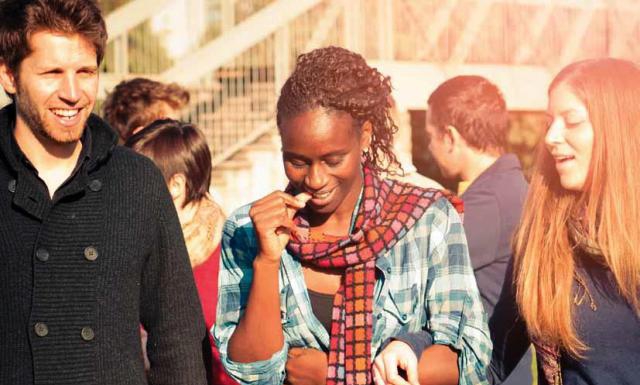Sodexo, the world’s largest services company, announces the findings of its ten year anniversary University Lifestyle Survey, the first since the introduction of the new university fee structure.
University fee increase forces change to traditional UK student stereotype
Since the sharp rise in university fees in 2012, the decision to attend university has become an increasingly complex choice for UK students. This is due to mounting financial pressures, changing attitudes towards university life and the value of education received, according to the results of the 2014 Sodexo University Lifestyle Survey – a representative survey of over 140 universities and 2,000 students throughout the United Kingdom.
As a result of the change in fee structures, expected student debt levels have increased substantially since the last Sodexo report in 2012. Almost one in five students in the UK (17 per cent) expects to take on debts in excess of £40,000, compared to 2 per cent previously, while 58 per cent expect at least £20,000 of debt. During a difficult economic climate, such financial impact of attending university has made choosing whether to enter higher education more crucial than ever, with over a quarter of students consulting their parents in making the choice – more than double the amount in 2012. Though, counterintuitively, the amount of students who report being worried about their debt on graduation decreased by 10% in 10 years (from 14% in 2004 to 4% in 2014) despite the rising levels of debt observed.
More strikingly, higher debt expectations have caused a sharp increase in the level of student dissatisfaction with the value of their education, with over a quarter of students (28 per cent) saying they did not think accruing so much debt was acceptable as a career investment, up by 10 per cent in just two years. Debt is also linked to 23 per cent of students changing their original choice of course.
Jane Longmore, Deputy Vice-Chancellor at Southampton Solent University and co-author and validator of the survey, noted: “This year’s survey results suggest that a time bomb may be ticking: the percentage of students who think of higher education as ‘the next obvious step’ diminished from 42 per cent among second and third years to 35 per cent among the most recent cohort. This finding prompts an interesting question: would nearly two-thirds of students be drawn to a plausible alternative to higher education if their return on investment could be better justified elsewhere? The Australian experience would seem to suggest otherwise; since the cap went in 2008, student numbers have risen by a national average of more than 20 per cent. Universities will have to work harder to demonstrate the value of higher education to students.”
The higher investment has led today’s students to focus more on the end-game – with a rising amount choosing to go to university to improve their future employment opportunities (76 per cent) and to increase their earning power (62 per cent). This marks a significant increase to the only 36 per cent of students focused on increasing their earnings in 2004. In light of this, the need to achieve a ‘good degree’ is more pressing than ever. Some 84 per cent of students said they worried about securing their desired degree classification in 2014, far higher than the 72 per cent troubled by academic concerns two years ago and a notable increase from the 61% citing this as a concern in 2004, when the survey was first undertaken. This is indicative of the added pressure to gain at least a 2:1 – a must for many employers – when students are investing far higher sums in their education than previous generations.
 Such added pressures have contributed to the observed trend over the past six years of students focusing more firmly than ever on their studies, rather than enjoying active social lives. More students than ever were worried about balancing their academic, social and work commitments – the second biggest source of stress (with 69 per cent citing this, up from 41 per cent in 2004). In fact, some 52 per cent of students cited saving as the main reason to socialise less. This is reflected in more than three-quarters of respondents (76 per cent) saying they spend £20 or less a week on socialising – up from 61 per cent in 2012. In order to achieve this, half of all students choose to stay in when hanging out with friends, with a third of students (33 per cent) saying they do not drink at all when socialising (up from 26 per cent in 2010).
Such added pressures have contributed to the observed trend over the past six years of students focusing more firmly than ever on their studies, rather than enjoying active social lives. More students than ever were worried about balancing their academic, social and work commitments – the second biggest source of stress (with 69 per cent citing this, up from 41 per cent in 2004). In fact, some 52 per cent of students cited saving as the main reason to socialise less. This is reflected in more than three-quarters of respondents (76 per cent) saying they spend £20 or less a week on socialising – up from 61 per cent in 2012. In order to achieve this, half of all students choose to stay in when hanging out with friends, with a third of students (33 per cent) saying they do not drink at all when socialising (up from 26 per cent in 2010).
As a result, most students view studying hard as their priority while in university. Hitting the books is the main activity of the day, with nearly three quarters (74 per cent) spending two to five hours a day in lectures, seminars or in the lab and about three-quarters (72 per cent) devoting two to five hours a day to private study. Moreover, some 18 per cent of this year’s respondents said they spend between six and eight hours a day in lectures, seminars or in the lab – a marked increase on the 9 per cent who had this amount of timetabled study two years ago. In light of this, it is not surprising that an increasing number of students, 61 per cent, have managing a heavy university workload as a major source of concern, over double the amount in 2004 (30 per cent).
The increased emphasis on studying was also reflected in the decrease in the number of hours students spent working part-time – only 36 per cent said they work 11-20 hours a week compared to 55 per cent in 2004 while 53 per cent work less than 10 hours a week, up from 36% per cent ten years ago.
Peter Taylor, Strategic Development Director at Sodexo, commented: “With greater challenges facing the students of tomorrow, universities need to be aware that living as a student, for three or more years, is a bigger decision to undertake than it was in the past. Not only must universities work harder to attract students, they must also accommodate dramatic changes in lifestyle and provide the best environment possible, to prepare students for the challenges they may face after they graduate.”
Interesting facts from the report:
 Housing
Housing- 34% live in a flat or house rented in the private sector
- 48% pay more than £300 a month towards their housing
- 37% found their student housing via the university's website
Socialising
- 50% stayed in to socialise or went to their friends' flats, halls or houses (42% in 2012)
- 26% socialise off campus compared to 19% who stay at university-run bars, cafes and clubs
- 76% said they spend only £20 or less on going out with friends (67% in 2012) of which 20% said they spent nothing at all (14% in 2012)
- 12% spend more than £30 a week on socialising, including smoking and drinking
- 47% of students in their 2nd year or higher now live quieter lives than in earlier years, compared to freshers
- 80% who socialised less did so because they had higher academic workloads
- 52% also mentioned a lack of cash as a reason for socialising less
- 18% said pressures of holding a part-time job had impeded their ability to get out more often
- 10% spend five hours a day or more socialising compared to 33% back in 2006
- 33% are now tee-total (26% in 2012)40% drink alcohol just once a week
Eating habits and requirements
- 45% spend £20 or less each week in term-time on feeding themselves
- 74% cook a meal from scratch using only raw ingredients at least once a week
- 79% make an effort to eat healthily
- 51% said they miss at least one meal a week
- 34% wanted to eat locally-sourced food compared to 51% in 2008
- 44% expect Fair Trade produce to be available
The importance of free range produce has waned
- 63% thought it important in 2008 compared to 39% in the latest survey
- Sustainable fish is no longer important with just 20% expecting it compared to 46% in 2008.
- 66% name price as the key factor in choosing where to buy a meal, down from 74% in 2012
University facilities and services
- 31% said they wanted to see more lectures online
- 76% said they would like to see their normal lectures recorded to view at another time
- 24% said good Wi-Fi access was the top factor when looking at accommodation
- 2% listed having a student bar or café as a top priority
- 56% said their university’s sustainability strategies and efforts to reduce waste or cut power usage mattered to them
- 22% wanted improvement in social areas, such as bars, cafes and clubs run by the university
- 21% required better IT facilities with 13% citing it as a top priority
- 19% requested improved library services, 12% of students said this was the most important improvement they’d like to see
- 16% called for improved sports facilities, drops to 6% when asked to choose one area to improve
For further information please visit www.uksodexo.com


